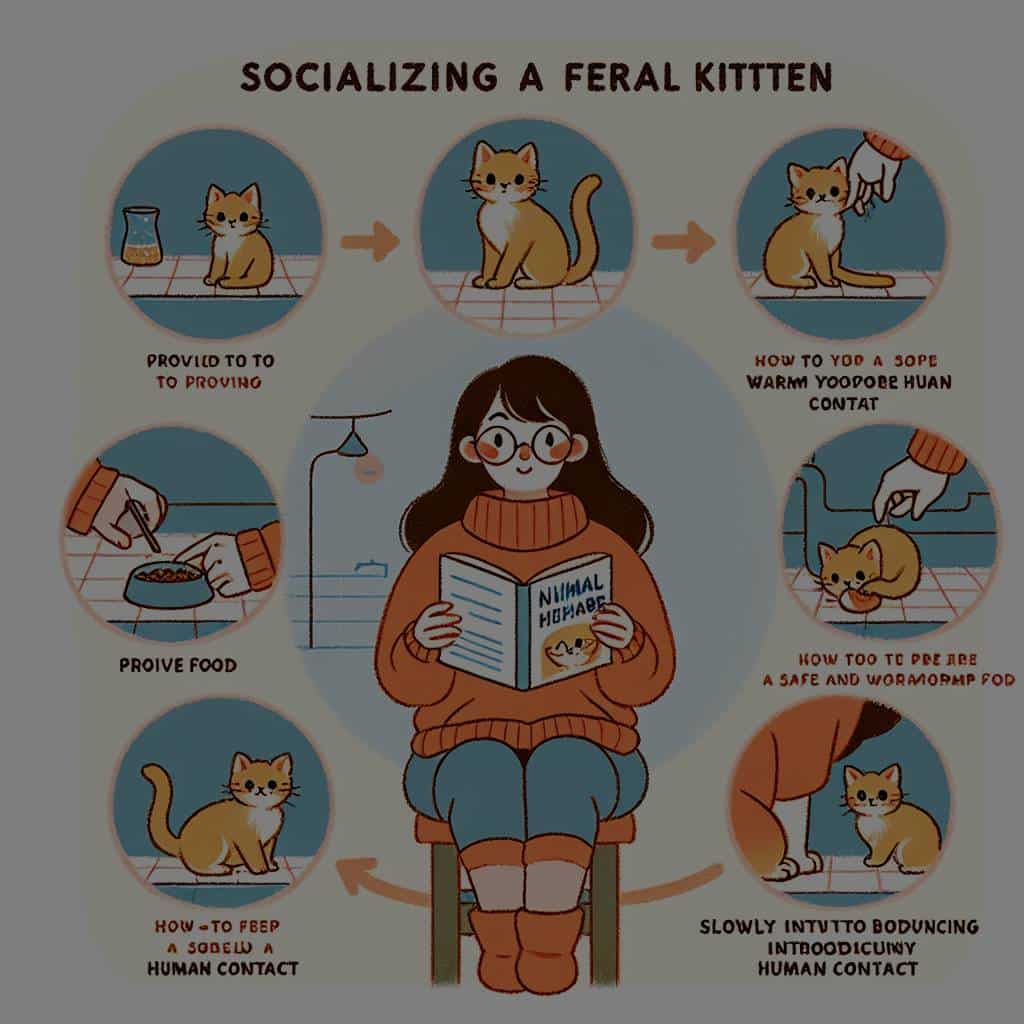What’s the Best Approach to Socializing a Feral Kitten?

In the realm of cat care and rescue work, one of the most rewarding yet challenging tasks is successfully socializing a feral kitten. Feral kittens can be found in various environments, from community parks to stored-away corners of backyards. They’re often seen as part of a larger colony of cats, living outside the familiar confines of a family home. You may be passionate about cats’ welfare, or you may have found a kitten in your area and want to help. Whatever your situation, learning how to socialize a feral kitten can be a transformative experience for both you and the kitten. With time, patience, and dedication, you can help a feral kitten adapt to a domestic environment and increase their chances of finding a loving home.
Understanding Feral Cats and Kittens
Before you begin the process of socializing a feral kitten, understanding what the term ‘feral’ actually means is important. Unlike stray cats who have once lived with people and are accustomed to human interaction, feral cats live their whole lives outdoors, away from human touch or intervention. They are often a result of pet cats being abandoned or lost, breeding in the wild and leading to generations of unsocialized cats in the community.
A lire en complément : How to Balance a Homemade Diet for a Dog Prone to Kidney Stones?
Feral kittens are usually born to these feral cat mothers. They have little to no experience with humans, which makes their behavior markedly different from the kittens born to domesticated cats. Feral kittens are not used to human contact and often view people with fear and suspicion. They might hiss, spit, or even try to bite when cornered or handled.
The Right Age for Socialization
Timing is crucial when it comes to socializing feral kittens. Kittens are most receptive to socialization between two and seven weeks of age. This is the window of opportunity when kittens are most likely to acclimate to human interaction and indoor living. After seven weeks, the chances of successful socialization decrease, although it’s not completely impossible.
A lire en complément : How to Train Your Pet Guinea Pig to Do Simple Tricks?
During these crucial weeks, the kittens learn to associate human contact with comfort and security. They get used to the smells, sounds, and interaction styles of human beings. This is also the time when they will begin to overcome their innate fear of humans.
The Process of Socialization
The process of socializing a feral kitten involves patience, consistency, and repetition. Initially, you should isolate the kitten in a small, secure room. This helps them feel safe in their new environment and prevents them from running and hiding. The room should be equipped with basic necessities such as food, water, a litter box, and cozy hiding spots.
Start by spending time in the room with the kitten, letting them get used to your presence. Speak softly and move slowly. Be consistent with your visiting times, so the kitten begins to expect and accept your presence. Over time, you can start to introduce toys, encouraging play as a form of interaction.
Food is a powerful tool for socialization. Offering food to the kitten can help build trust and positive associations, reducing fear and encouraging interaction. Wet food is particularly enticing for kittens and can be used to lure them towards you.
Remember, every kitten has a different personality and comfort level. Some may respond positively within a few days, while others may take weeks. Always respect the kitten’s boundaries, avoid forcing interaction, and allow them to progress at their own pace.
Involving Community and TNR Programs
While you’re working on socializing the kitten, it’s also important to connect with local community cat programs and Trap-Neuter-Return (TNR) initiatives. These are essential for managing the feral cat population and preventing future generations of feral kittens.
TNR programs involve trapping feral cats, having them spayed or neutered, and then returning them to their outdoor habitats. This helps control the population of feral cats, ensuring they can live out their lives without contributing to the problem of overpopulation.
Community cat programs also provide educational resources and support for those interested in helping feral cats and kittens. They can guide you through the process of socialization and provide medical care for the kittens.
Remember, socializing a feral kitten is a commitment that requires time, patience, and consistent effort. However, transforming a scared, unsocialized kitten into a loving and trusting pet can be one of the most rewarding experiences.
Nurturing a Fear-Free Environment
Creating a fear-free environment is a critical part of the socialization process for feral kittens. It is pertinent to remember that these kittens have likely never experienced the comfort and safety of a domestic setting. Therefore, they will likely react with fear and suspicion initially. It’s up to you, the carer, to provide a setting that promotes calmness and trust.
Begin by choosing a quiet and secure space for the kitten. The space should be small enough to ensure the kitten doesn’t feel overwhelmed, such as a bathroom or a laundry room. Equip the room with essentials like a litter box, soft bedding, toys, and food and water dishes. Since feral kittens are used to hiding as a form of safety, providing a box or a pet bed with a cover can offer a sense of security.
Try to minimize noises and sudden movements, which could startle the kitten. This includes turning off loud appliances, keeping other pets away, and moving slowly. Play soft music or use a white noise machine to create a soothing atmosphere.
At this stage, the goal is not immediate interaction but rather letting the kitten adjust to a new environment. Your presence in the room, even without direct contact, can be a significant first step towards establishing trust. A fear-free environment will help the kitten associate human presence with safety and comfort, acting as a cornerstone for the socialization process.
The Role of Play in Kitten Socialization
Play is a natural instinct for kittens and serves as a powerful tool in the socialization process. It not only promotes bonding but also provides mental stimulation and physical exercise for your feral kitten.
Cats are natural hunters, and play mimics these hunting behaviours. Toys that mimic prey, like small stuffed animals or feather wands, are often favourites. Be sure to allow the kitten to capture the ‘prey’ occasionally to maintain their interest and confidence. Remember to keep yourself at a safe distance initially to avoid intimidating the kitten.
Interactive toys that involve both the kitten and the carer can be introduced gradually. These include laser pointers or a wand with feathers or bells. Remember, the goal of play is to create positive experiences with humans, so always maintain a gentle approach.
Keep in mind that each feral kitten is unique and will react differently to different types of play. Pay close attention to the kitten’s responses and adjust your play approach to suit their comfort level.
Conclusion
Socializing a feral kitten is undeniably a challenging endeavour, but with patience, consistency, and love, it can also be an extraordinarily rewarding process. By understanding the unique needs and behaviours of feral kittens, creating a fear-free environment, and using play as a tool for bonding, you can help transform a feral kitten into a loving pet.
It’s essential to remember that not all feral kittens will respond to socialization in the same way or at the same pace. Be patient, respect their boundaries, and allow them to progress at their own pace.
By working with community cat programs and supporting TNR initiatives, you’re not only helping the kitten you’ve taken in but also contributing to the wider effort of managing and supporting feral cats in your community.
With time, patience, and dedication, the scared alley cat you found can become a cherished family member, providing a rewarding experience and a testament to the transformative power of care and compassion. By learning to socialize kittens, you’re not only giving them a chance at a better life but also enriching your own.
